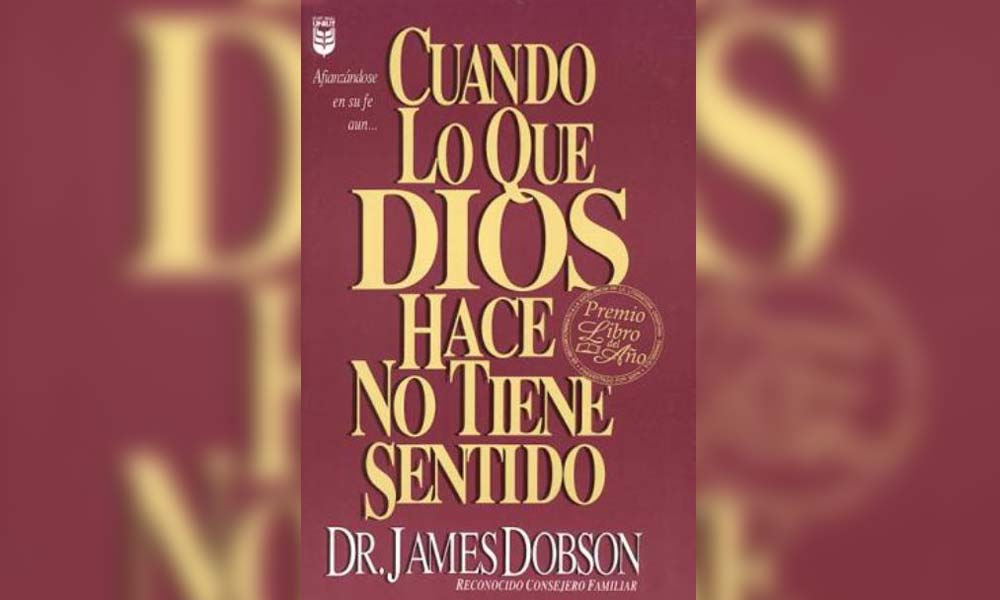“Cuando lo que Dios hace no tiene sentido”, es el título del libro escrito por el pastor evangélico James Dobson, fundador de la organización de Enfoque a la Familia, y quien en esta ocasión nos dice que, aunque seamos cristianos practicantes, no estamos exentos ni inmunes a los infortunios, sinsabores y calamidades de la vida diaria.
Dobson nos habla de cuando en las situaciones más difíciles surgen las preguntas “¿por qué a mí?”, “¿por qué no aquel que vive una vida desordenada y llena de maldad?”, “¿Dios, por qué ahora que más te necesito me dejas solo?”, entre otras que ponen a prueba nuestra fe.
Por ejemplo, en uno de los capítulos de este libro un hombre relata su experiencia con una hija a quien le amputaron una pierna debido a un tumor maligno que se alojó en su rodilla.
Cuenta que desde el momento que recibieron el diagnóstico, la familia y las personas de su iglesia comenzaron a orar por su sanidad, pero a pesar de todos los rezos y los esfuerzos de los doctores, la niña finalmente perdió la pierna.
El hombre comparte cómo se derrumbó cuando el médico le comunicó la noticia y el enojo que esto provocó con Dios por haber permitido que sucediera. Renegó y durante días no le importaron las palabras de aliento que le daban las personas a su alrededor, porque no encontraba respuestas.
Tras el doloroso relato, Dobson dice: “No exija explicaciones. No cuente con su habilidad para comprender. No se suelte de su fe. Escoja confiar en Dios, usando la voluntad que él ha puesto en usted. La única otra alternativa es la desesperación”.
Entonces, si lo que has vivido durante este año te ha parecido difícil o no le encuentras sentido, te invito a leer este libro, escrito desde el corazón de un hombre, tan humano como tú y yo, pero con la suficiente fe para aportar descanso a tu corazón en medio de lo que puedas estar vivir hoy.
When God doesn’t make sense
“When God Doesn’t Make Sense”, is the title of the book written by Evangelical Pastor James Dobson, founder of the Focus on the Family organization, and who this time tells us that even though we are practicing Christians, we are not exempt or immune from the misfortunes, heartaches and calamities of everyday life.
Dobson tells us about when in the most difficult situations the questions arise “why me”, “why not the one who lives a disorderly life full of evil”, “God, why do you leave me alone now that I need you the most”, among others that test our faith.
For example, in one of the chapters of this book a man tells of his experience with a daughter who had her leg amputated because of a malignant tumor that had lodged in her knee.
He says that from the moment they received the diagnosis, the family and people in his church began to pray for her healing, but despite all the prayers and doctors efforts, the girl finally lost her leg.
The man shares how he collapsed when the doctor told him the news and the anger this caused with God for allowing it to happen. He refused and for days did not care about the encouragement words from the people around him, because he could not find answers.
After the painful story, Dobson says, “Don’t demand explanations. Don’t count on his ability to understand. Don’t let go of your faith. Choose to trust God, using the will he has placed in you. The only other alternative is despair. So, if what you have experienced during this year has seemed difficult to you or you do not find meaning, I invite you to read this book, written from the heart of a man, as human as you and I, but with enough faith to bring rest to your heart in the midst of what you may be living today.

